What it’s like to do MIQ in New Zealand (Managed Isolation & Quarantine)
Some links in this post are affiliate links, which means I earn a small commission if you book through them, at no extra cost to you. This support helps keep this site running, the suitcase wheels spinning, and lets me keep writing ultra-detailed travel guides that are free for you to use to plan your next adventure.
Kia ora, my friends! If you’ve been following along on Instagram you’ll know that I recently participated in an elaborate ruse to help one of my best friends surprise her family by returning home to NZ from Vancouver.
It was a rollercoaster and a bit of a logistical clusterfuck, but all the stress was worth it to see the look on her parents’ faces when she walked through their front door. I’m not crying, you’re crying.
But before we got to the good bit, there were plenty of setbacks, hurdles and bureaucratic nightmares to overcome. Getting home to New Zealand in the pandemic is not easy, especially when the country has some of the toughest border restrictions in the world and has essentially locked Kiwis abroad out of the country for much of the past 21 months.
I know lots of you are keen to hear more of the ins and outs of the MIQ (Managed Isolation and Quarantine) process from start to finish so I thought I’d put together a little guide/diary on our experience in early December 2021.
The first few sections of this guide explain the very long story of why I even ended up in MIQ if you’re interested in that. If you want the practical info like how to book an MIQ spot, how much MIQ costs and our experience in the MIQ hotel, you can skip straight there using the links in the summary below.
Things to note: The MIQ process and New Zealand’s border restrictions can change without warning so the requirements when I travelled might be very different to when you travel. The experience is also different depending on your citizenship/eligibility to enter New Zealand, what country you’re travelling from, whether you’re vaccinated, etc. This is all based on my own personal experience but please check the official websites like covid.govt.nz for up-to-date information.
What is MIQ?
MIQ (Managed Isolation and Quarantine) was set up in April 2020 to help incoming travellers isolate on arrival in New Zealand as the pandemic was starting to gain momentum around the world.
It’s had various iterations over the past 21 months but the basic premise is a bunch of hotels around the country that are run as managed facilities for isolation (all incoming travellers) and quarantine (symptomatic travellers, close contacts + confirmed Covid-19 cases in the community or in incoming travellers), in order to keep Covid out of the community.
The hotels are run in conjunction with the NZ Defence Force and Police and there are strict infection prevention protocols in place from the airport, to when and how you can exercise, as well as regular onsite testing. Originally MIQ was 14 days, but it changed to 7 days + 3 days self-isolation at home in November 2021.
Managed Isolation is the term they use for the facilities that host incoming travellers with no symptoms, Quarantine is where they put confirmed cases or symptomatic travellers.
But… aren’t there already Covid cases in new Zealand?
Now there are!
New Zealand had some pretty incredible success at the start of the pandemic where we essentially stamped out any community spread through an intense six-week lockdown in March/April 2020, and we were lucky enough to enjoy almost total freedom for about 16 months.
Because of our strict border control, cases out in the community were very rare and when we did have a case through some kind of border/MIQ breach, it was generally stamped out with a short and sharp lockdown.
However, in August 2021 our luck ran out and a Delta outbreak began spreading throughout Auckland. We immediately went into a three-day lockdown to flatten the curve but it was already too far ahead and lockdown compliance was (unsurprisingly) not as good this far into a pandemic.
Long story short, the country contained the outbreak to Auckland and a smaller outbreak in the Waikato, with Auckland spending more than 100 days in lockdown, Waikato wasn’t too far behind, and the rest of New Zealand managed to get away with Level 2 restrictions (masks + contact tracing required but most industries operating as normal) for the remainder of 2021. I live in the Waikato so was in lockdown for some of Aug/Sept and most of Oct/Nov.
This outbreak really changed the risk profile around MIQ and it’s been a huge point of contention in government/the media/for anyone overseas or anyone with friends and family overseas. MIQ was a necessary tool to minimise the risk of Covid getting into New Zealand, however when there’s already cases spreading unchecked throughout Auckland, and hundreds of confirmed Covid cases isolating in their own homes, does it make sense to make vaccinated Kiwis who have tested negative multiple times stay in a hotel room for 7 days, with many of them having to pay for the privilege? No, it doesn’t.
I could rant about this for hours (and I have, many times!) but I’ll just say these two things:
1) New Zealand’s healthcare system is not built to handle a widespread Covid outbreak, and we need to do what we can to reduce the risk. But…
2) Vaccinated Kiwis coming home, who have tested negative before a flight and tested on arrival, pose minimal risk when Covid is already circulating in the community.
I do believe that MIQ made sense pre-NZ’s Delta outbreak (not that it was necessarily run in the best way), but now I think the system hasn’t caught up to the current situation. ANYWAY that rant is over.
A quick note: As of 19 December there are currently our first eight cases of Omicron in MIQ, which does somewhat change the risk of incoming travellers since I began writing this blog in MIQ two weeks ago. I still don’t think it’s fair to have such a cruel system in place this far into a pandemic, and I stand by my viewpoint that Kiwis should be able to return when they need to (and want to) without this level of emotional and financial stress, but I also do understand the need to protect the vulnerable people in Aotearoa. I know it’s difficult to find the balance, but from my personal experience and from seeing what my friends have gone through, I can say that they absolutely have not found that balance yet.
How I ended up in MIQ
As many of you know, I’ve been “stuck” in New Zealand since March 2020 when I returned home to ride out the pandemic. I thought I might be here for a few months, maybe worst case scenario until the end of 2020, but this thing has dragged on much longer than I think any of us imagined it would.
I could’ve left at any stage during the past 21 months, New Zealand always allowed its citizens to leave (unlike Australia), but if you leave there’s no guarantee that you can return as flights were few and far between, and MIQ spaces were extremely limited and difficult to book.
I had a small taste of being unable to get home right at the beginning of the pandemic, and it’s a level of stress I wouldn’t wish on anyone. Trying to desperately book flights (very expensive ones at that) to get back to your family as borders shut one-by-one, then said flights getting cancelled and having to start the process again, is a moment that is burnt into my chapter of travel nightmares. Because of this experience, I made the decision quite early on that I wouldn’t leave the country until I knew I could get back if there was an emergency at home.
The only way to ensure I could leave and still be able to get home was to book an MIQ spot, but I also wasn’t going to take up a coveted MIQ spot from Kiwis overseas trying desperately to get home just so I could go on holiday, so I came to terms with the fact that I’d be sticking around NZ a little bit longer.
But…
The cruelty of the MIQ system
In late October 2021, one of my best friends (Bex) and I concocted a genius plan. Bex is a Kiwi citizen and permanent resident of Canada, she’s lived in Vancouver for almost two and a half years. She last saw her family in early 2019 and has since had a baby nephew here in NZ who she hasn’t met. She dealt with extended periods of lockdown in Canada, working from home for almost two years, and she was pretty desperate to come home to see her whanau (family).
Bex tried for months to get an MIQ spot to return to New Zealand, with no luck. They used to release MIQ spots randomly every couple of weeks so you needed to be constantly refreshing the website in order to have any chance of securing a spot.
In September 2021 they switched to a lottery system where they announced set dates where they’d release a certain number of rooms available to book once a week.
Each traveller could enter their passport number into the ‘lobby’ an hour before the lottery, and they’d be randomly assigned a number in the lottery. That number would determine the order that you’d be let into the date selection part of the process. Basically, the lower your number, the more likely you were to be able to get your chosen travel date. They normally released 2500-3500 rooms each week, so if you got #1-#5000 you’d have a chance (assuming people who get in later are less likely to find a travel date that suits so might pull out of the queue), but anything over and it’s probably not worth you sticking around for the slow and painful countdown for the dates to get all booked up.
Seems a bit inhumane to gamify citizens being able to return to their home country, doesn’t it? The lottery system is, in two words, fucked up. Kiwis overseas with dying family members back in NZ were being made to enter the same lottery as Kiwis in NZ who wanted to go skiing in Europe for winter. Local music festivals somehow managed to secure a bunch of elusive MIQ rooms for international DJs right before New Year, however Kiwis with mental health issues, financial struggles or expiring/expired visas were trying week after week to get a golden ticket. The system is incredibly unfair and I’m embarrassed that this is how we treated Kiwis overseas while being placed on a pedestal around the world for our Covid response.
One of the major problems with the lottery when it was first launched is that each traveller (not each group/booking) had an equal chance of getting a spot, meaning that couples/families/groups had a significantly higher chance of getting an early lottery number than any solo travellers. A family of four could enter the lobby four times because they can enter on each passport, whereas Bex travelling by herself could only enter once.
MIQ for two, please!
I’m lucky to live a life where my time is extremely flexible, I’m self-employed and I can work from anywhere, I don’t need to apply for annual leave or worry about anyone depending on me. I had also applied for a self-isolation pilot for New Zealanders who needed to go overseas for business, and had set aside some money for flights + self-iso costs if I got it. After missing out on the self-iso pilot, I suggested to Bex that we join forces in the lottery, both enter with our own passport details and essentially double her chance of being able to get home. If she got a spot she’d come home as she had originally planned, and if I got a spot I’d book for both of us and essentially pick her up from somewhere and fly home with her.
In our first lottery attempt as a duo back in mid-October, Bex got #19373. I got #602. We were going to get a spot.
IMPORTANT: I want to clarify here that I would never take up an MIQ spot from someone who needed to return just so I could leave the country. I was fully prepared to chill out in NZ until MIQ is abolished (as I have for many months so far), and my desire to go on holiday or work overseas is absolutely non-essential travel and not what MIQ should be used for, in my opinion. The only reason I went ahead with this was because Bex was trying to come home anyway so I wasn’t taking up any extra space, I was just giving her a better chance of getting that spot and being able to return home to see her family. I am also a firm believer that there should have been some sort of prioritisation of MIQ rooms, based on urgency and need. If we could have given up our spot and specified for it go to someone who needed it more than Bex needed to return then we absolutely would have done that, but unfortunately that’s not an option. (Yes – not only are Kiwis overseas entering a “lottery of human misery” as it’s now been coined, they then have chronic guilt when they do finally get a spot).
We made it through to the date selection when there were still a range of available dates through November, December and January. Bex needed time to plan working from NZ and to pack things up, so we decided to book for 6 December, meaning we’d emerge from 14 days in MIQ on 20 December, just in time for Christmas. After locking in a spot you have 48 hours to book and confirm your flight details to secure your room.
We had a few different country options available for where to meet before returning home together, but we settled on Fiji for four days which was cheap for me, an easy option for Bex, had great Covid protocols in place to protect their locals and they opened to tourism on 1 December so we were there for opening week.
If I needed to, I literally would’ve flown to LA for a few days to “pick up” Bex and bring her back home (like an international chaperone!) so Fiji being a safe and cost-effective option was a bonus!
And that’s how I ended up in MIQ with my best friend to help her surprise her family for Christmas! There were plenty of dramas with me leaving New Zealand and getting to Fiji but I’ll be putting that all into a guide on departing New Zealand during a pandemic.
Another quick note: After we used the two-traveller loophole to increase Bex’s chances of getting a spot, they actually changed the system to make it more fair for solo travellers and then only allowed one lottery entry per group. This is how it should’ve been at the beginning, giving everyone equal chance of getting a room no matter how many people in their group.
Who needs to MIQ on arrival in New Zealand?
As at the time of writing (14 Dec 2021) all international arrivals are required to MIQ for seven days on arrival, then self-isolate at home for three days.
From 17 January 2022, fully vaccinated NZ citizens, residents and eligible visa holders arriving in New Zealand from Australia will not need to use MIQ, and will instead be required to self-isolate for seven days instead.
From 14 February 2022, fully vaccinated NZ citizens, residents and eligible visa holders arriving in New Zealand from all other countries (except high risk countries) will be able to self-isolate for seven days on arrival.
From 30 April 2022, fully vaccinated tourists will be able to enter New Zealand with seven days of self-isolation, possibly staged by visa category (more announcements to come in 2022).
MIQ will still be used for unvaccinated Kiwis (other travellers such as residents and tourists must be vaccinated to enter) and for anyone travelling from countries classified as ‘very high risk’.
MIQ is on its way out for most vaccinated Kiwis, which is brilliant news.
Update: As of 21 December, there have been some changes to the border reopening plans. The reopening to Kiwis in Australia and Kiwis in other countries have been pushed back to end of February. The MIQ process has also been changed from 7 days in MIQ + 3 days self-iso, to 10 days total in MIQ and no self-isolation requirement.
How to get an MIQ spot in New Zealand
MIQ spots are released through the Managed Isolation Allocation System (MIAS).
There is generally a release each week and they update this page on the website with release details a few days before. If you’re looking for a spot, bookmark this site and check every couple of days.
You need to enter the lobby in the hour before the lottery begins. If you enter the lottery after it has started, you’ll automatically be sent to the back of the queue.
You will need to log in to the MIQ allocation system before the lottery begins with your passport details and proof of your eligibility to travel to New Zealand (e.g. NZ passport number, residency permit or visa details).
The hour in the lobby counts down second by second, until the ‘please wait’ circle of doom appears and you wait to see where in the queue you’ve been drawn.
If you’re lucky enough to get drawn in the lower few thousand, you wait as that number counts down until it’s your turn. 3-2-1, you’re in the room. You’ll then see a calendar with the available dates for your arrival. You need to ensure that whatever date you choose lines up with a flight from wherever you’re flying from. This can be tricky as many airlines are still flying on reduced schedules, but there’s a flight checker on the MIAS website to see all confirmed flights.
If your number is higher than the amount of rooms still available, you can still wait in the queue in case the people ahead of you pull out for whatever reason, like if there are no travel dates that work for them.
Once you book a spot you have 48 hours to add in your flight booking number and confirm your spot. If you don’t provide a flight booking number within that time, your spot is automatically forfeited.
After your flight and MIQ spot is confirmed, you’ll receive your MIQ voucher and that part of the process is done.
What does New Zealand’s managed isolation cost?
The cost of MIQ depends on your citizenship, when you left New Zealand and how long you’ll be back for. This flowchart from the Ministry of Business, Innovation and Employment (MBIE) clearly explains who is liable for MIQ costs.
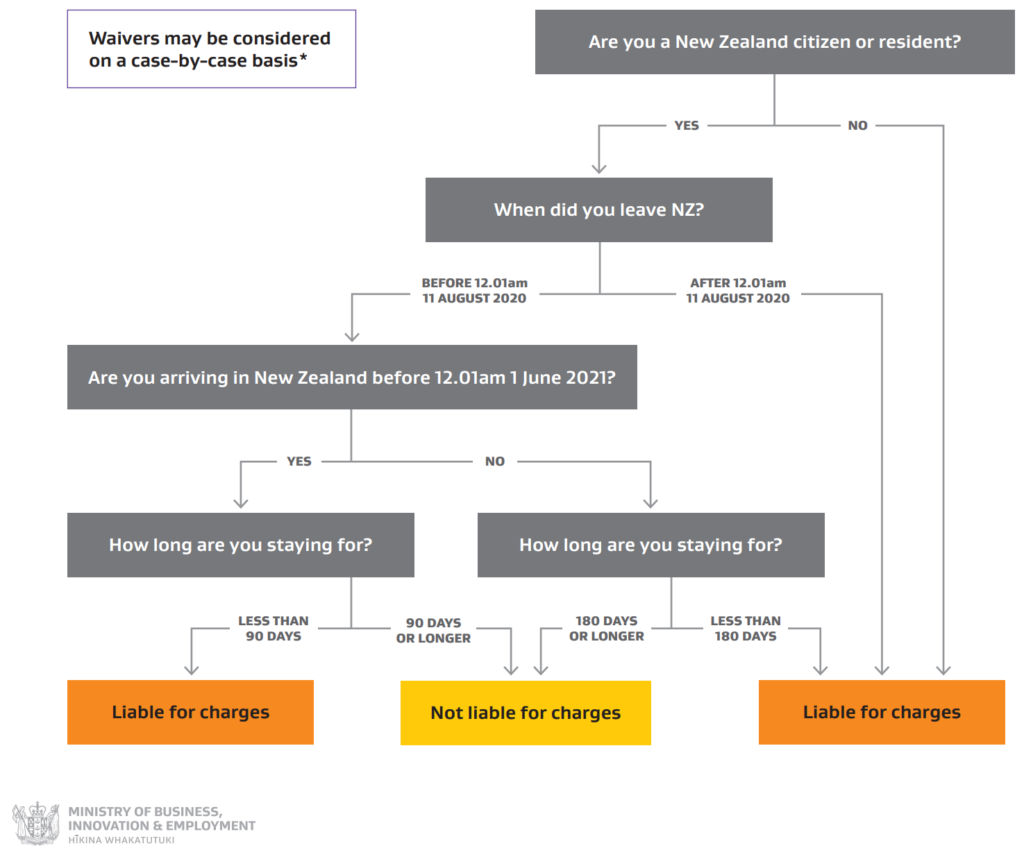
When MIQ was 14 days (pre-Nov 2021) the cost for a New Zealand citizen who was liable to pay was $3100 for the first adult, $950 for an additional adult in a room, and $475 for an additional child in a room.
When MIQ was cut down to 7 days these charges almost halved, to $1610 for one adult, $460 for an additional adult and $230 for a child.
Bex left NZ before 11 August 2020 so that means if she was moving home permanently (or for more than 180 days) she wouldn’t be liable to pay, however she’s only here for three months, meaning she will need to pay. I am obviously liable for charges as I only left NZ a week before I returned haha.
We agreed that Bex would pay the first adult charge of $1610 as this is what she would have needed to pay if she was coming back solo as she had originally planned, and I would cover the $460 cost for an additional adult.
Getting into New Zealand
New Zealand is not open to all travellers right now so please check entry requirements and eligibility before booking anything.
New Zealand citizens can enter the country provided they have an MIQ spot. New Zealand citizens do not need to be vaccinated to enter New Zealand (however the airline they fly with may have a vaccination requirement) and they can arrive from any country provided there are flights available.
Permanent residents can enter but they must be vaccinated and must not have been in a ‘very high risk’ country for 14 days prior.
Other eligible travellers may be partners of Kiwi citizens, resident visa holders or work visa holders, and the requirements are dependent on your specific situation. Most non-citizen and non-resident travellers will need a CPVV (critical purpose visitor visa) to be able to enter the country – this can take a couple of weeks so get onto this ASAP if you think you’ll need it.
From April 30, entry to New Zealand will open to foreign nationals (i.e. tourists) with a requirement of 7 days’ self-isolation and this opening may be staged depending on visa category. You can find out more about New Zealand’s reopening to the rest of the world here.
Arriving in New Zealand and getting to our MIQ hotel
We landed in New Zealand at 3.30pm on Monday 6 December. Our flight from Fiji was almost empty, there were only 14 other people on it!
Once we landed we made our way through a health check (questions about symptoms + temperature test) and then a long-winded multiple stop customs check. We spoke to four different customs officers at different points, all asking the same questions, which was confusing and seemed very inefficient. This part of the process didn’t take long for us as our plane was so small which was great.
At the final check there was a sign on the glass that said we were going to the Rydges Hotel in Central Auckland.
There are MIQ hotels in Auckland, Hamilton, Rotorua, Wellington and Christchurch, and you don’t know where you’re going until you go arrive at the airport. There is a brilliant hotel tracker that’s been put together by some ex-MIQers from the ‘New Zealand Hotel Quarantine’ Facebook group to help people predict where they’ll end up which was handy to keep an eye on.
Once you arrive at the hotel, someone in full PPE comes onto the bus and explains the check in process. Each family, travel group or ‘bubble’ gets off the bus one by one and stands 2m apart in the forecourt until they’re called into reception. At the reception area they’ll ask you for dietary requirements and will give you a welcome pack for MIQ and for the specific hotel with relevant info like meal times and exercise info. Then they’ll give you your room key and send you up to your home for the next 7 days.
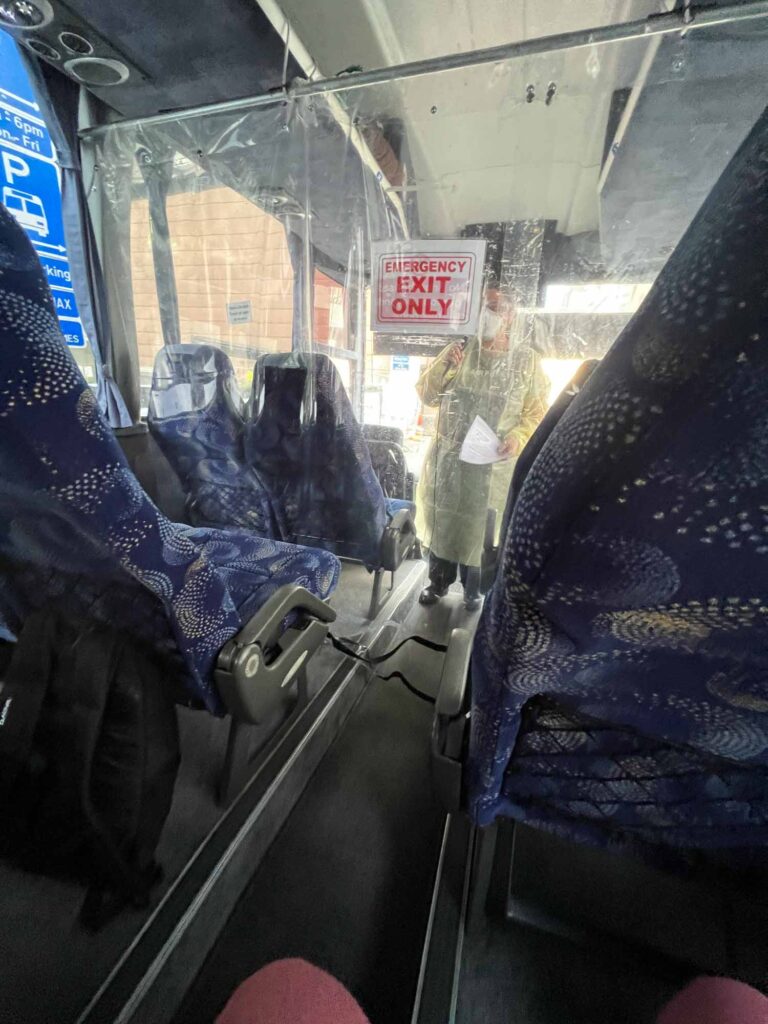
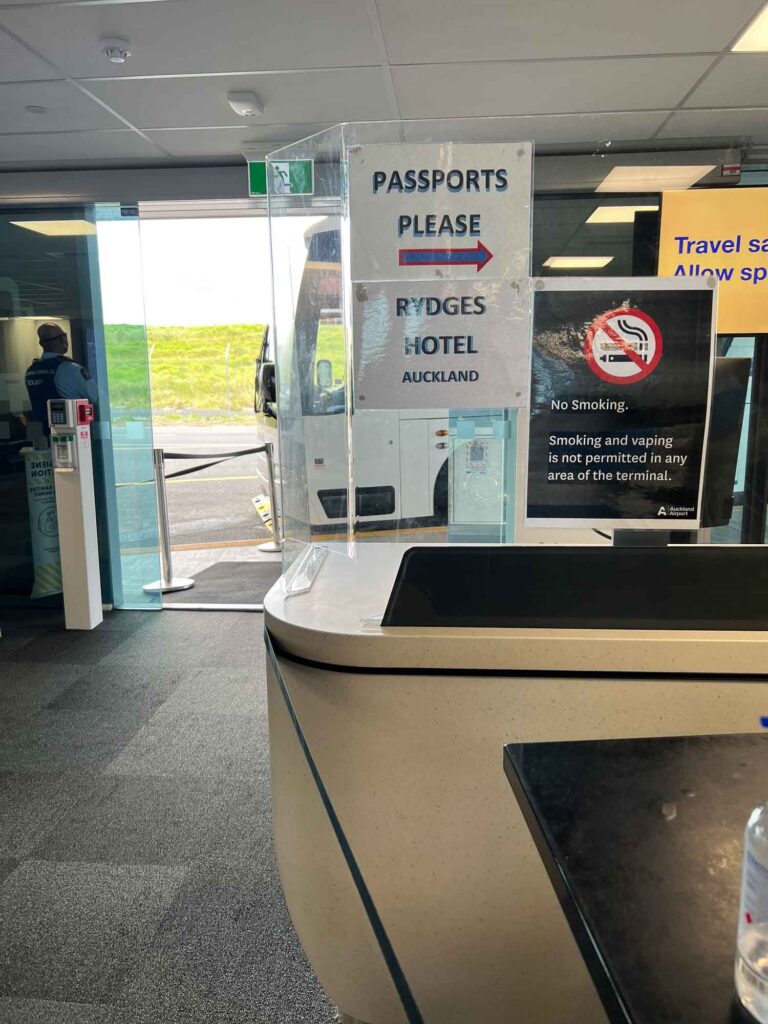
The hotel
Every hotel is different and the standards, facilities and processes are very inconsistent, so I can only speak about my experience at the Rydges in Central Auckland.
The Rydges is a classic business hotel, coincidentally right across the road from my old office where I used to work for four years before I moved to London.
The room was basic but fine. We got two double beds, a TV, a desk, a mini fridge, kettle, wardrobe and bathroom. We pushed both beds right to the wall so we had more floor space in the middle. I also brought a Chromecast to hook up to our TV which meant we could cast Netflix to the big screen.
We were on the third floor so looked across into a carpark building but we did have a sweet view of the Sky Tower and we got a decent amount of natural light all day, and we had an opening window for fresh air (some MIQ hotels don’t have windows). The air con was great too, it was hot and humid in Auckland so it was nice to stay consistent at 22 degrees.
Our hotel offered one laundry run per room during the week, you put your clothes in a bag outside your door and they’d get it back to you washed, dried and folded the next day.
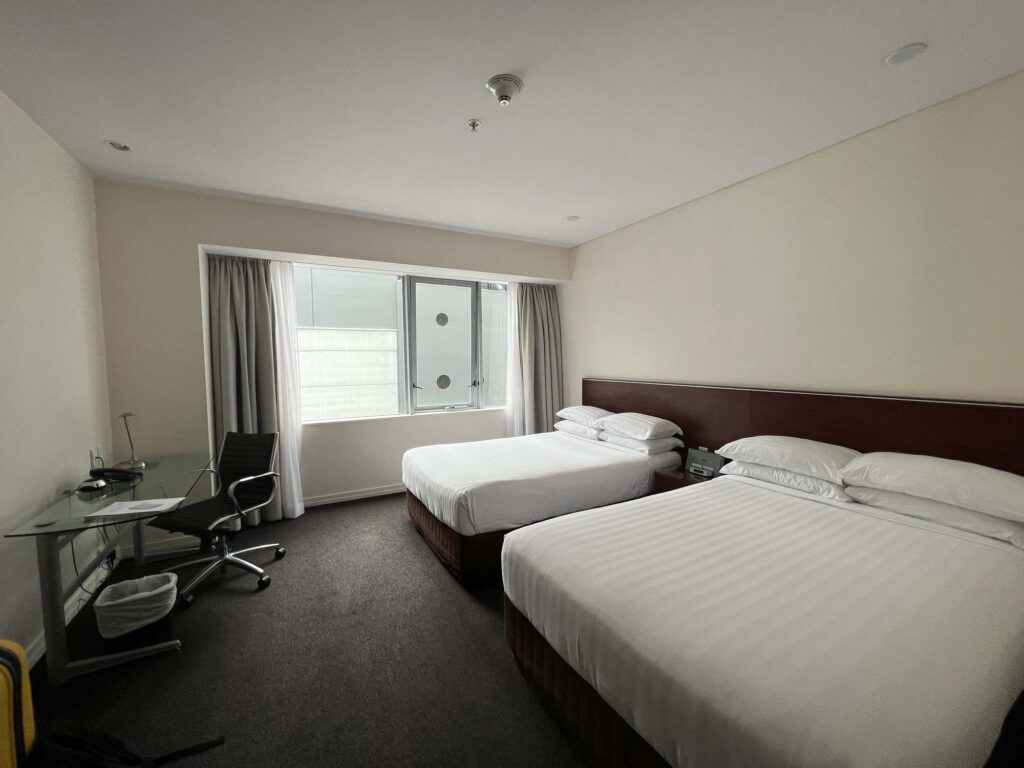
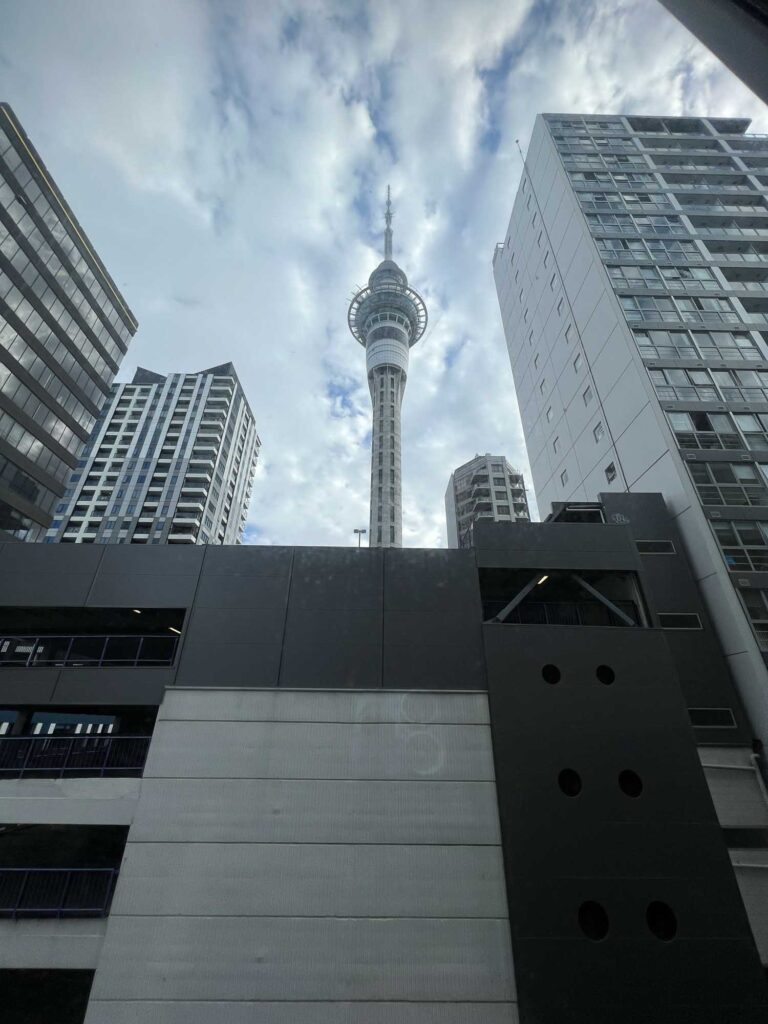
The food
This is what I was most worried about with MIQ as the food standards are really inconsistent across the different hotels so it’s just luck of the draw. I also have weird dietary requirements (with no gallbladder, certain foods are a no-go for me but it’s not something easy to explain like gluten free or lactose intolerant), so I knew I’d be a difficult guest.
Some hotels have options for each meal, some provide the menu a day in advance so you know what you’ll get and can plan alternative meal delivery if you don’t want it, and in some you just get what you’re given. Our hotel was the latter.
We had three meals a day dropped off at set times. Breakfast + a morning snack between 6.30am and 8am, lunch + an afternoon snack between 12.30pm and 2pm, and dinner + a sweet treat between 6.30pm and 8pm. My usual routine is to wake up at 9.30am, work on and off during the day, usually have dinner around 9pm, snack at midnight and go to bed by 2am, sooo the meal times were less than ideal for me but I understand I’m in the minority. Bex was working on Vancouver time and started work at 5.30am so the meal times were pretty perfect for her.
One frustrating thing with our hotel was that you could only get UberEats deliveries during meal times, because there was a rule about staff limiting their need to go to different floors throughout the day… Even though there was an on-site barista who could drop off coffees at any time of the day. Just one of the many contradictions that didn’t really make sense. Anyway, the issue with UberEats was that if my dinner got delivered towards the end of meal service and it was something that I didn’t like or couldn’t eat, I wouldn’t have enough time to order UberEats and have it delivered before the meal service finished. Just a small annoyance that absolutely is not the end of the world, but I wanted to share so you know what to expect.
We were also allowed drop offs from friends/family and supermarket delivery so we stocked up on some essentials and snacks and always had something to eat if we needed it.
Our hotel meals were really impressive to start off with, in the first few days we had gourmet burgers, breakfast bagels, waffles, roast pork, and steak with veges! The meals did drop in quality towards the end of our stay, like cereal for the last few mornings which was a bit disappointing after getting used to hot breakfasts, but they were still good enough and big enough for a short 7 day stay,
The on-site barista was open from 9am (yes, even though breakfast was served from 6.30am!) until 10.30pm and they had hot drinks, sweet treats and beer, wine and cider which you could order through room service and then pay for by credit card when you leave MIQ.
Our room had cups, mugs and spoons but no other cutlery or crockery, we just got meals in cardboard boxes and wooden cutlery which feels so gross to eat with. Luckily I had read somewhere that this might be the case so I packed two lightweight melamine plates, two sets of cutlery, a collapsible camping bowl, a sharp knife for cutting fruit and a dish cloth and tea towel. We asked the kitchen to not give us cutlery or plastic water bottles for each meal which reduced our waste.
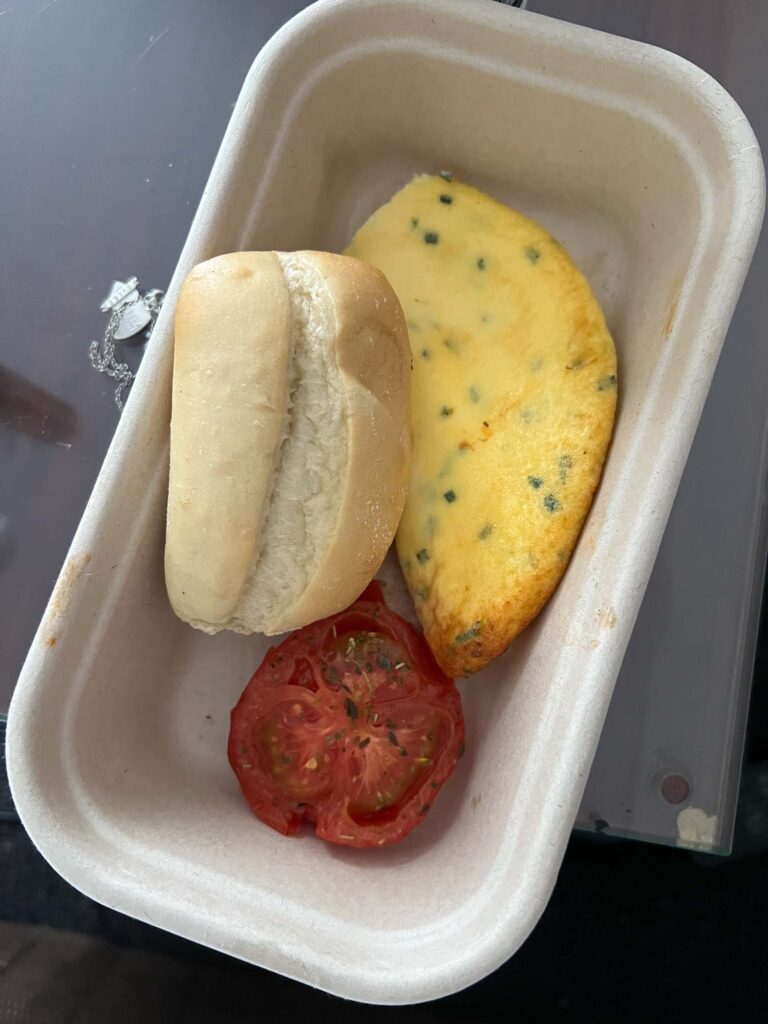
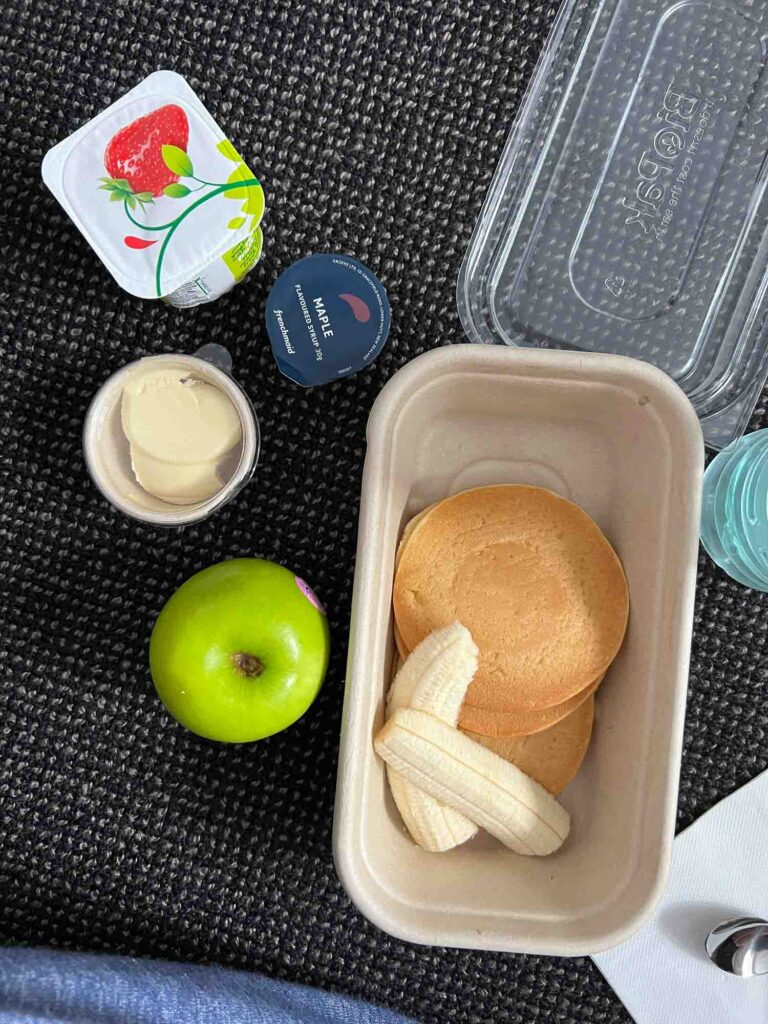
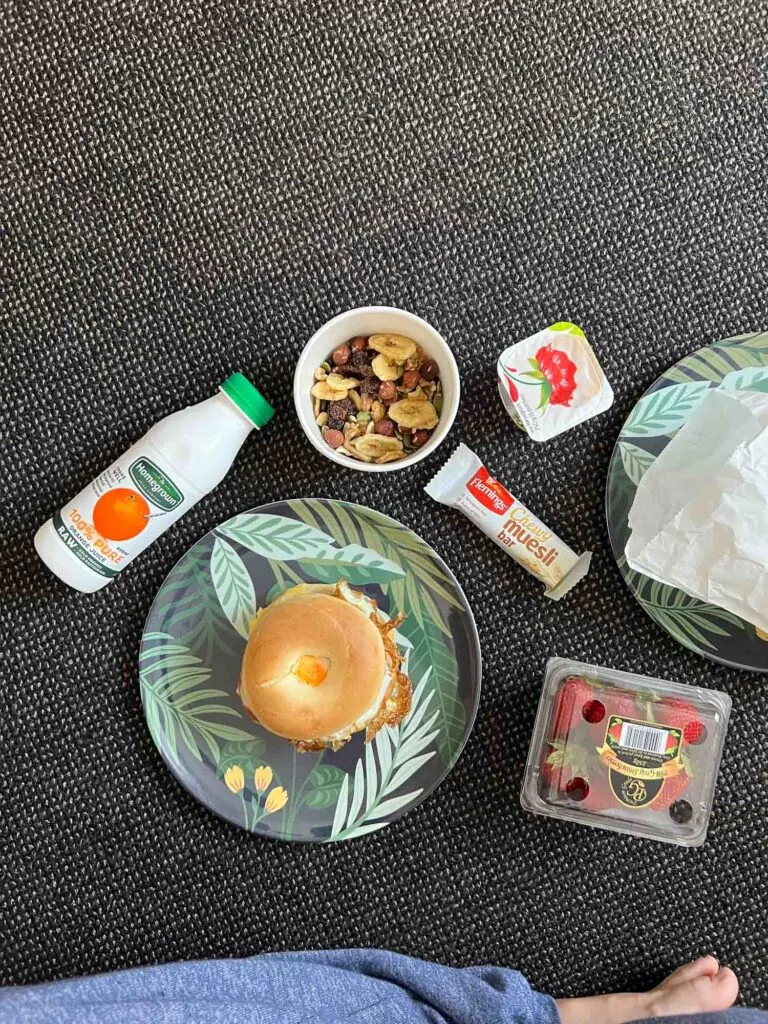
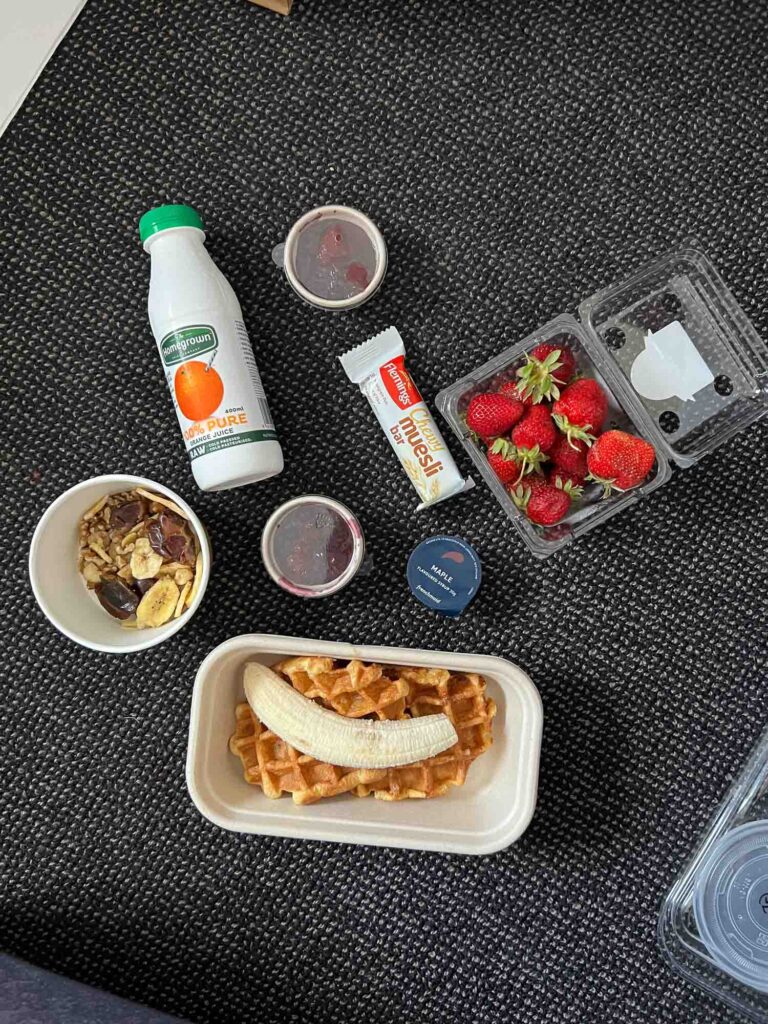
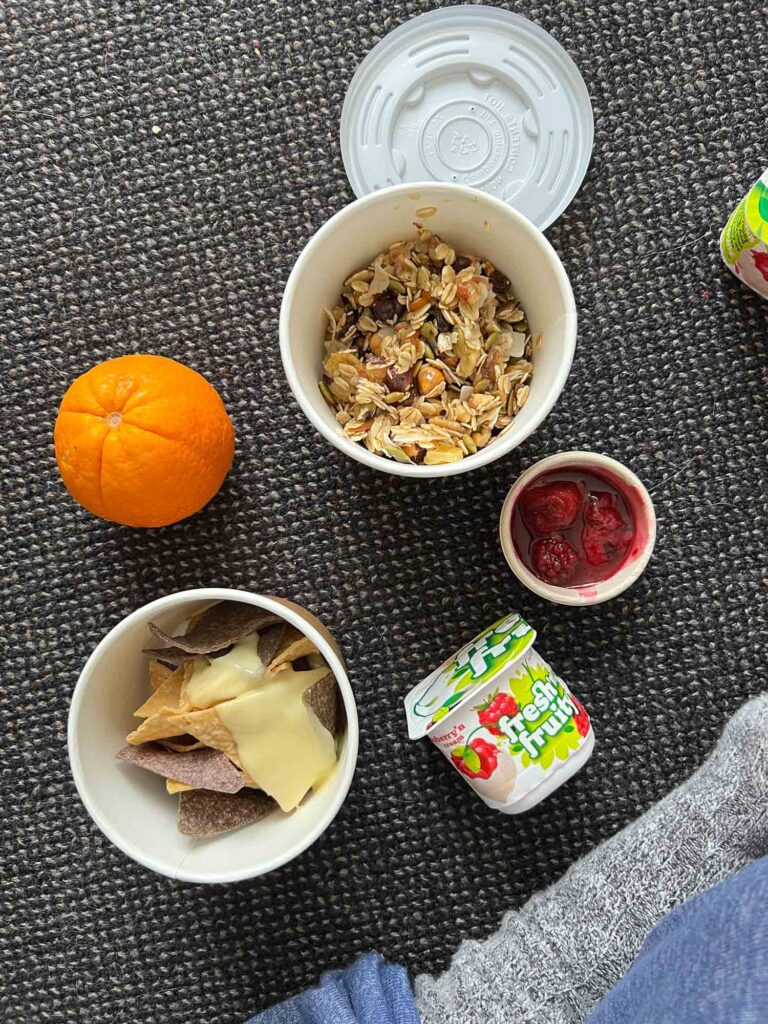
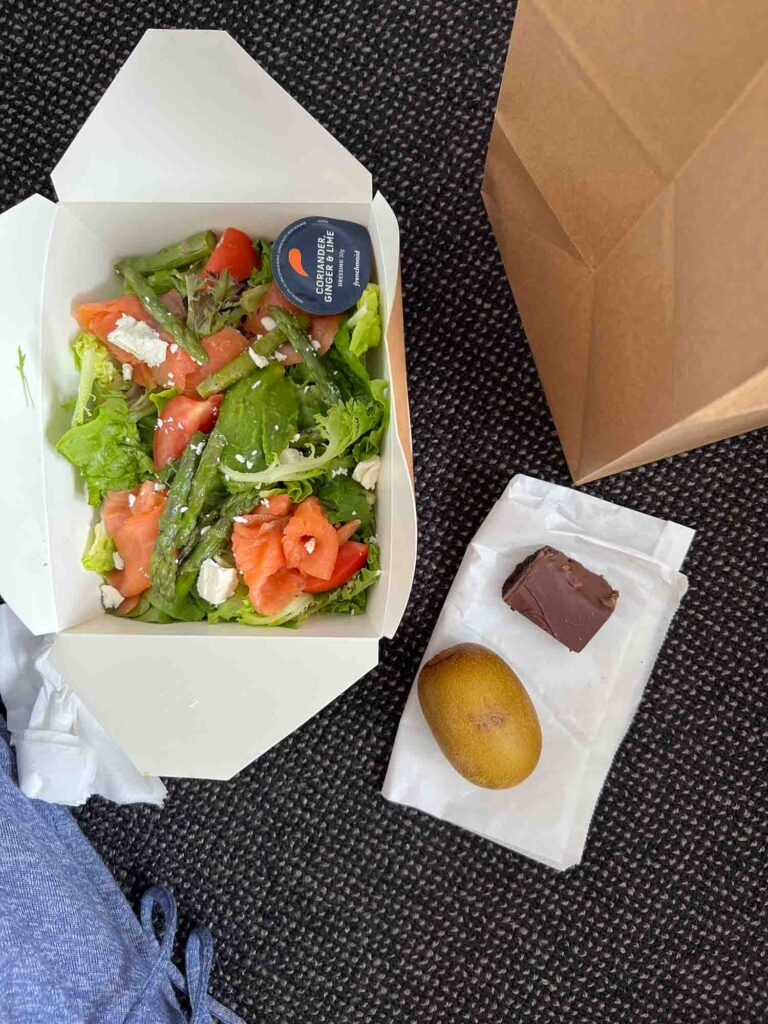
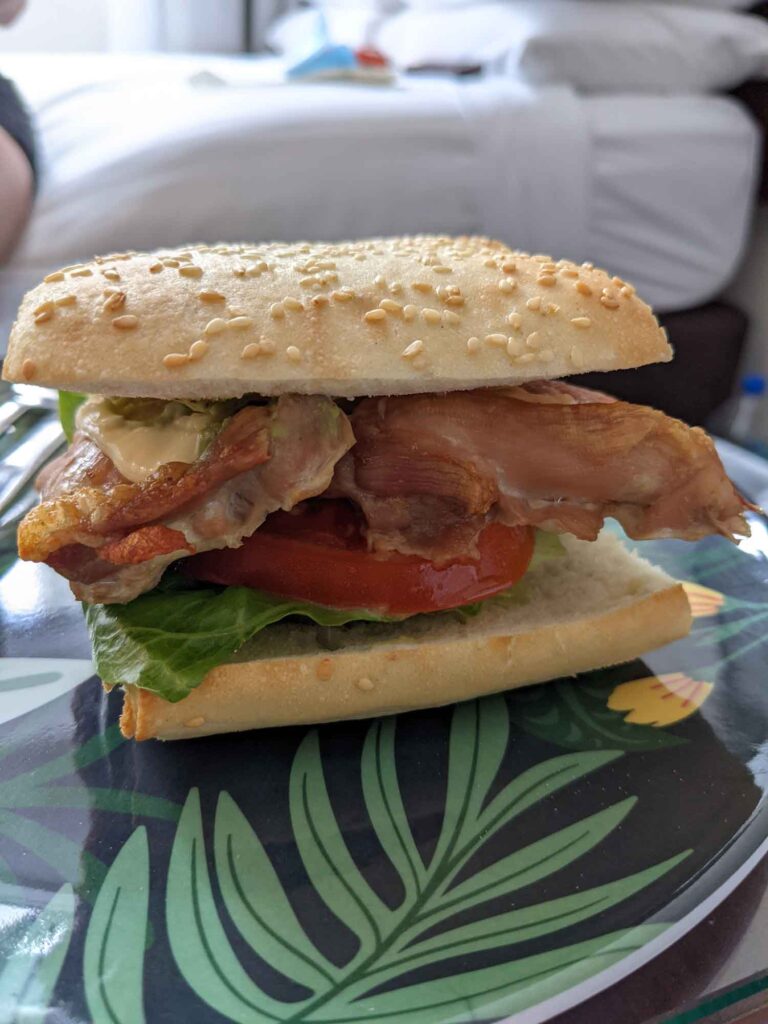
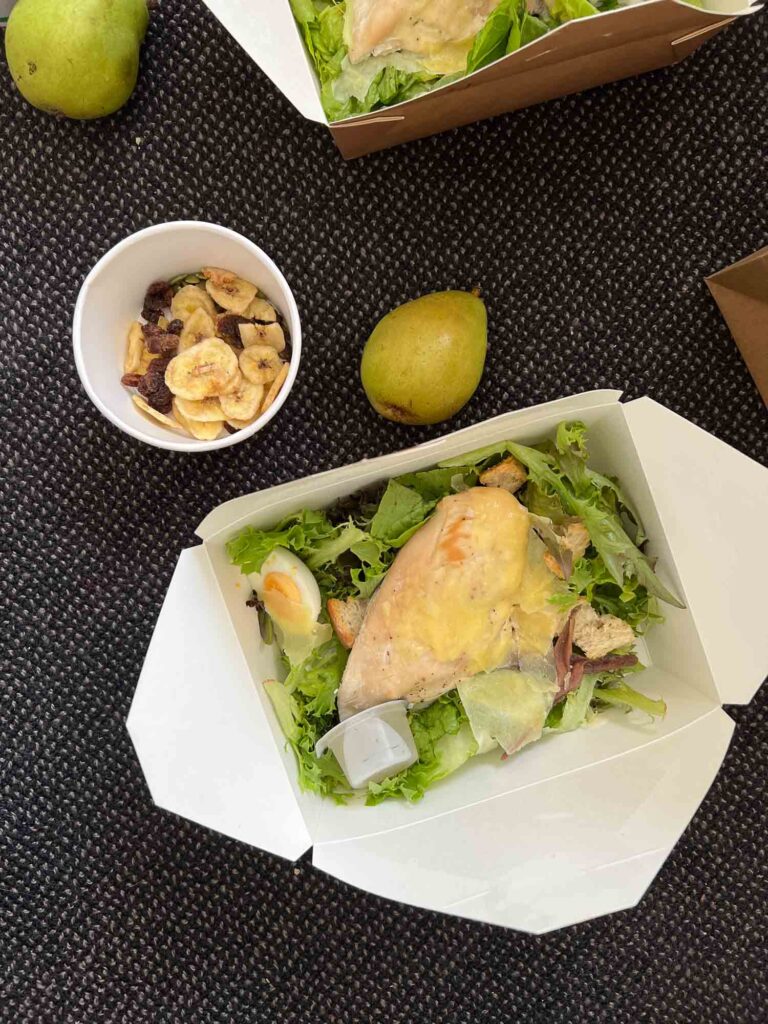
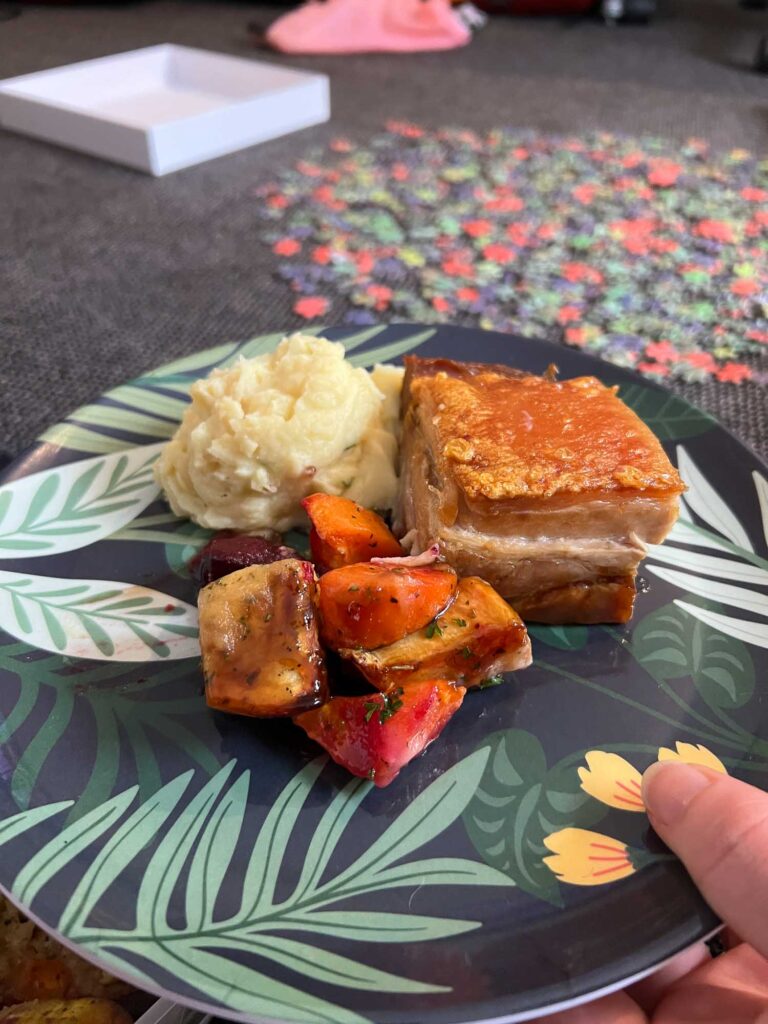
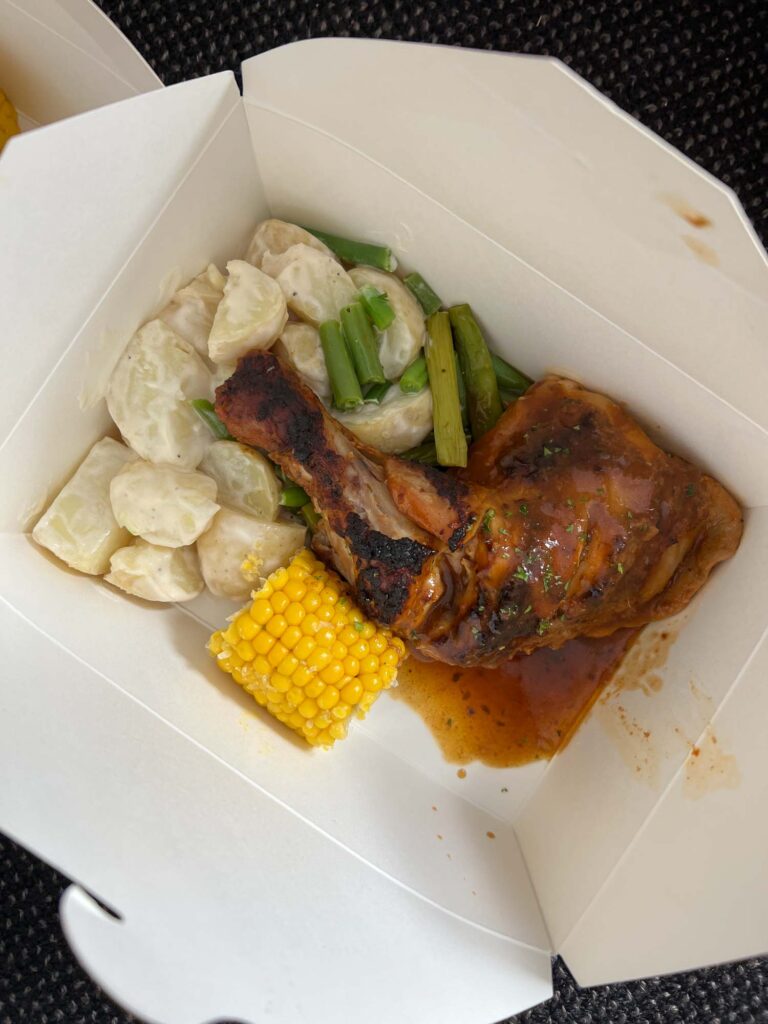
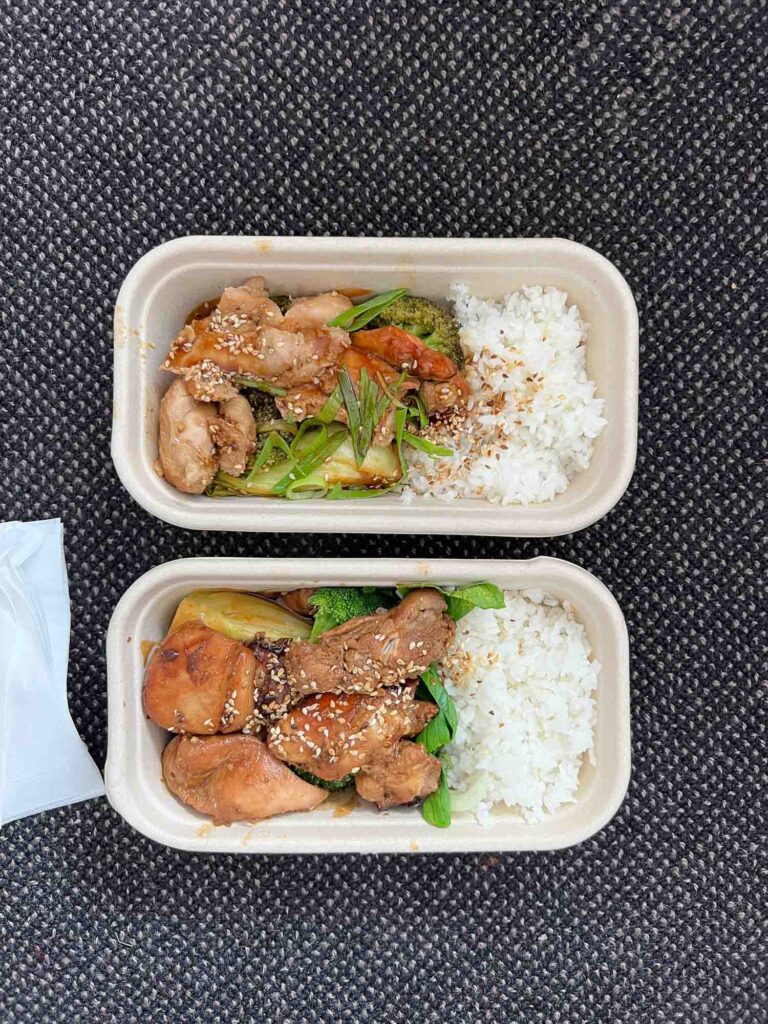
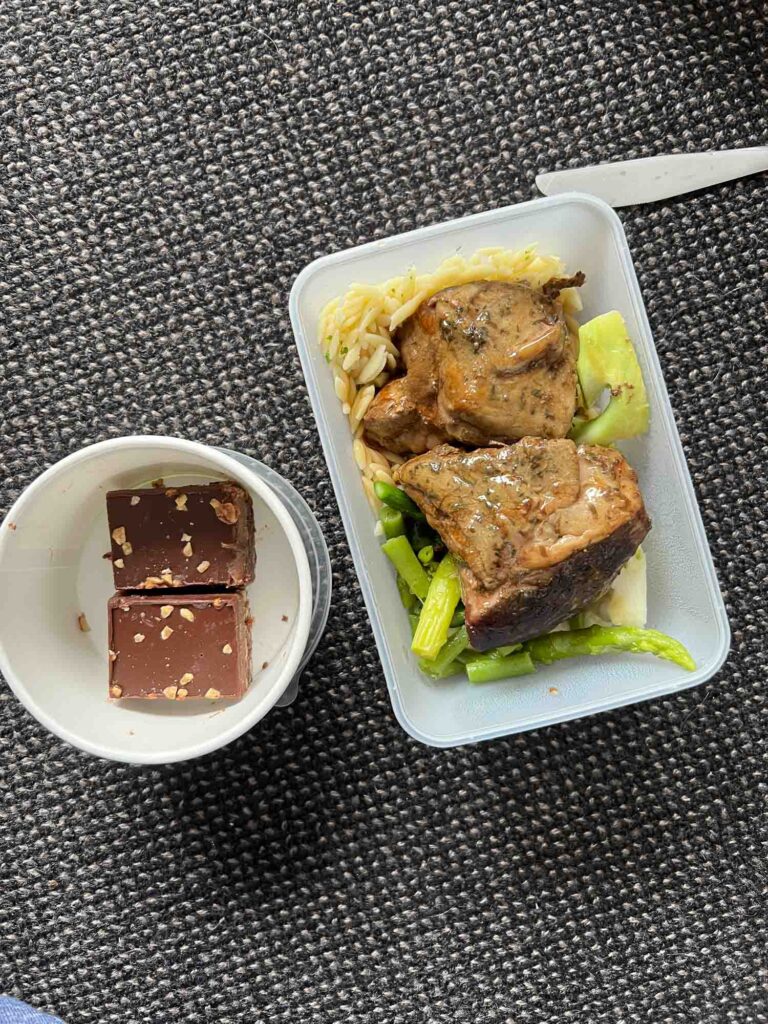
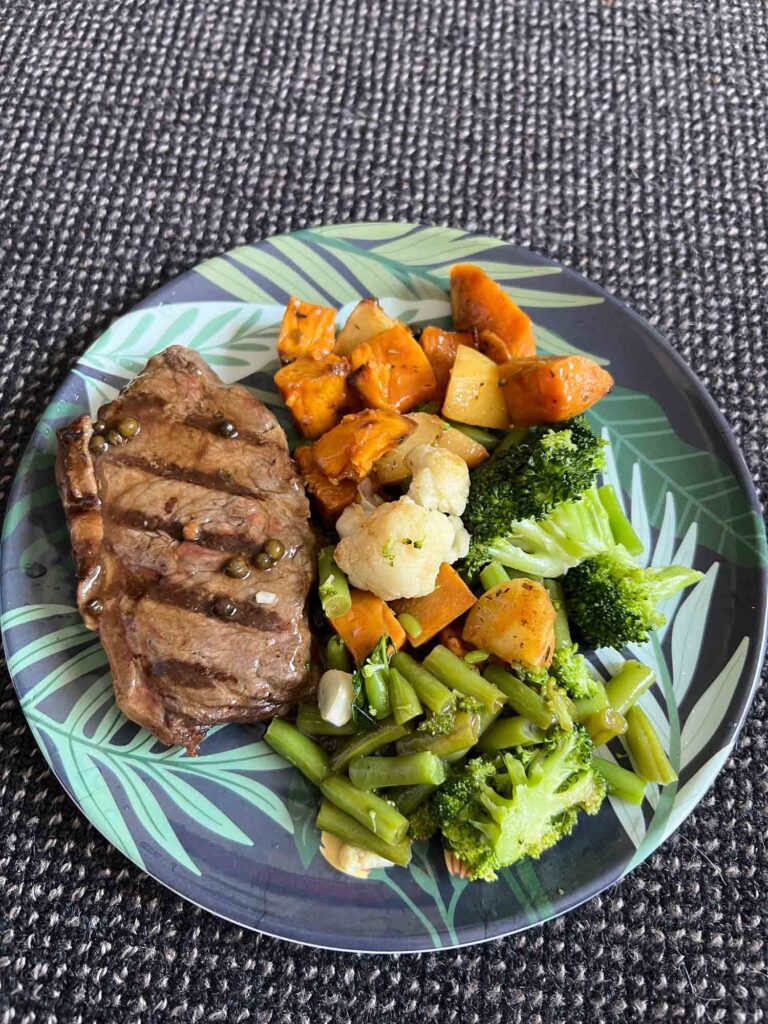
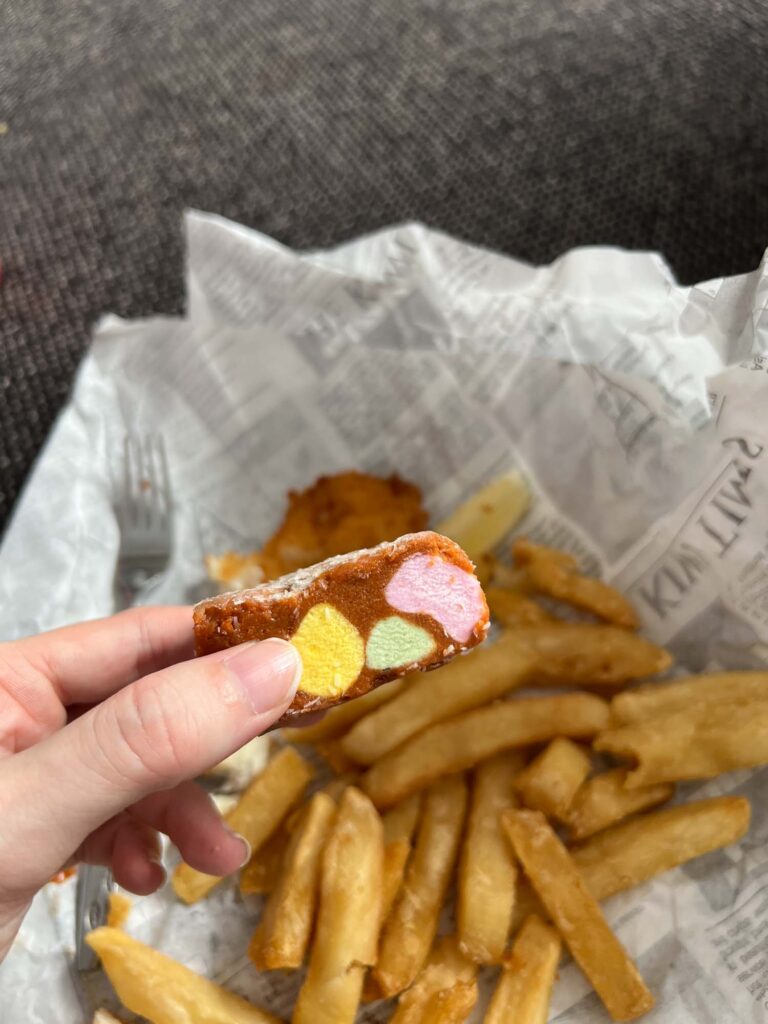
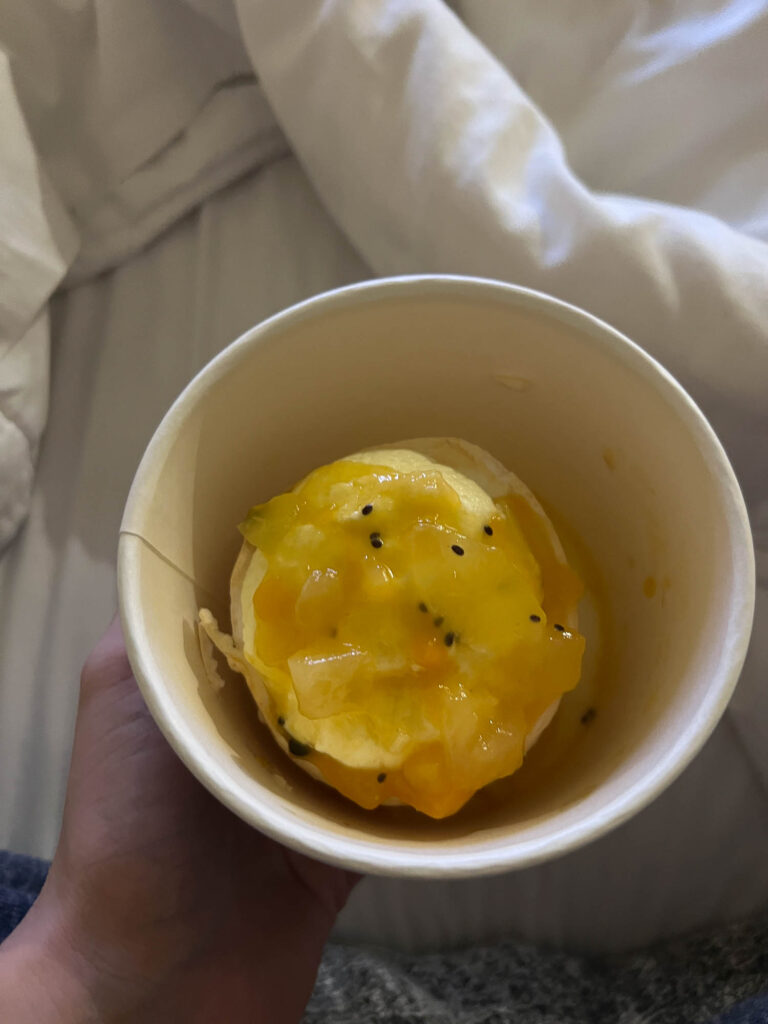
You can’t order any alcohol via UberEats or food delivery as the drivers are required to site your ID when they give you the drinks, but friends and family can drop off alcohol. There are limits per day based on standard drinks and if someone delivers more than the allowed amount for one day then the MIQ staff will ration it out to you over a number of days. The daily limit is one bottle of wine per person or six cans of beer or four RTDs. Spirits are not allowed and will be held at the front desk for you to pick up when you leave.
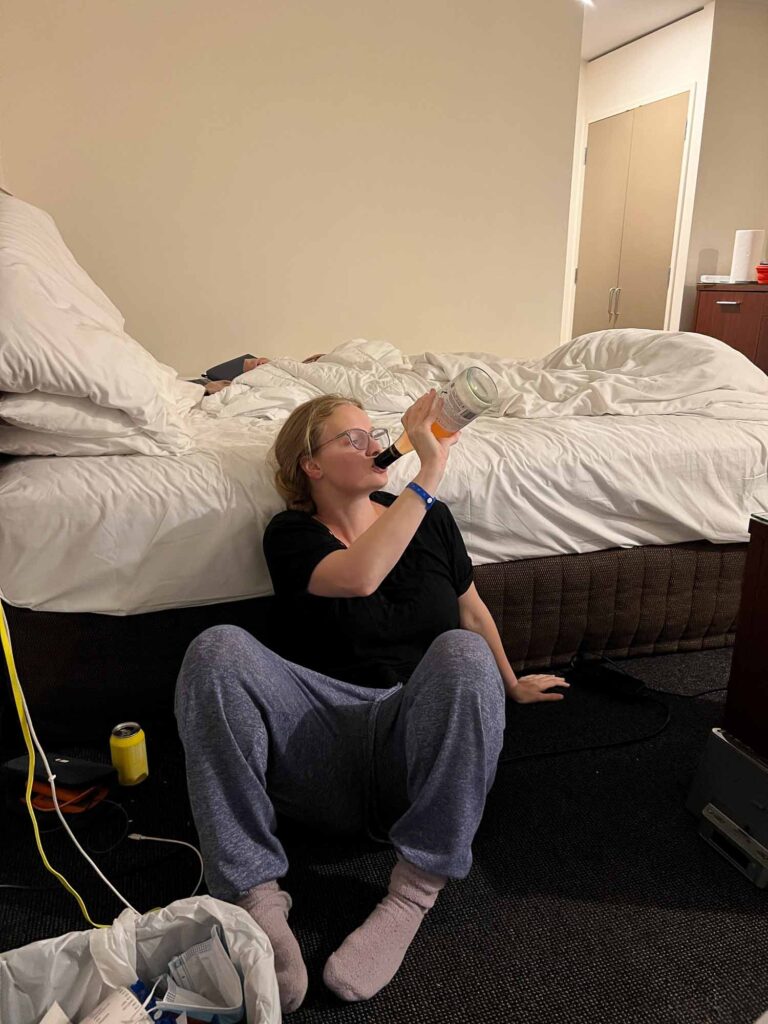
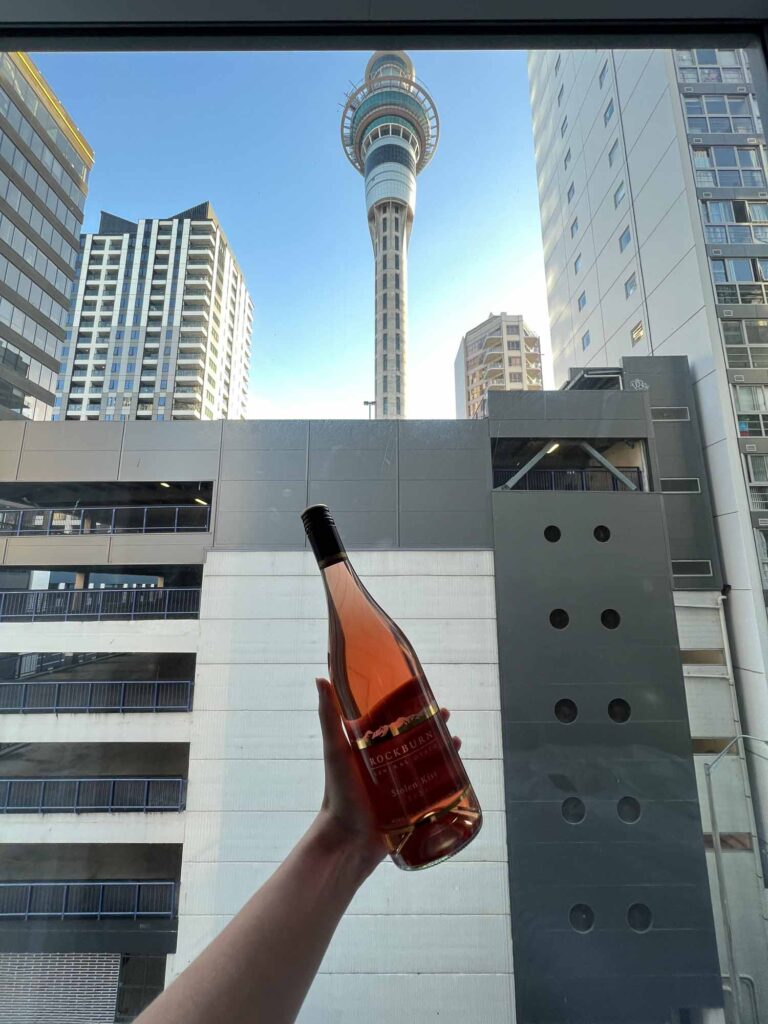
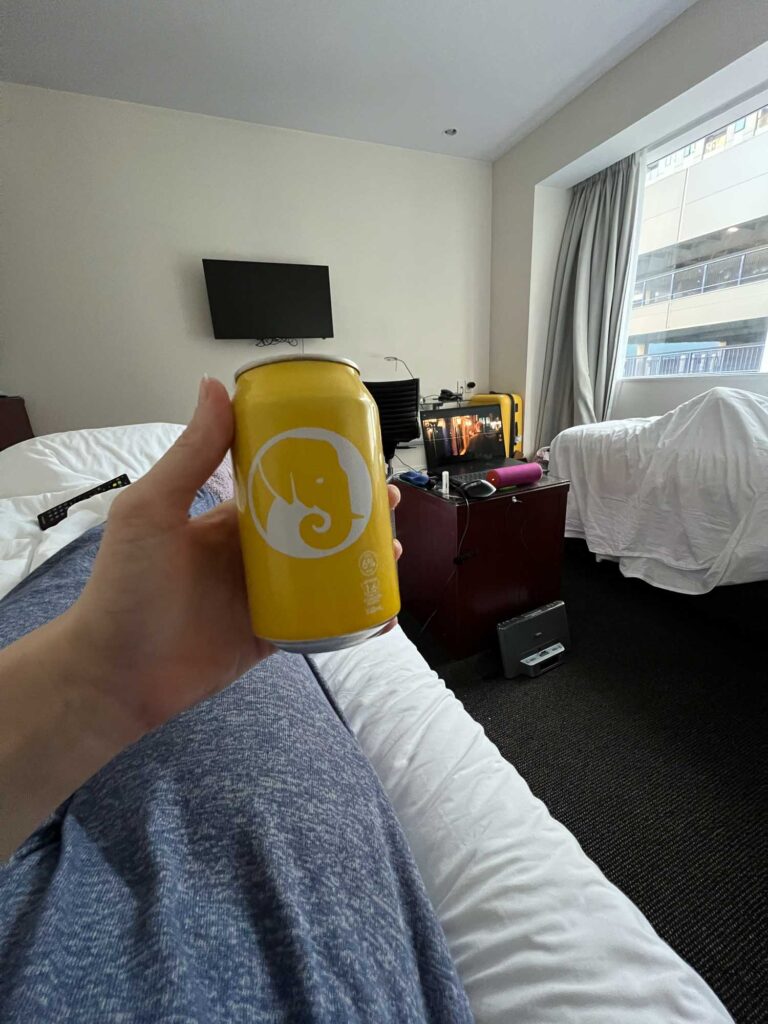
Exercise
In MIQ you are not allowed to leave your room for any reason until your Day 1 test comes back negative (usually 24 hours), once you have a negative test then you’re given a blue band which means you’re allowed to book exercise sessions.
Again, each MIQ hotel has different rules for exercise, including how long you’re allowed outside, where you can go and what you can do.
At the Rydges we had three outdoor areas: the carpark ramp, the rooftop and the forecourt.
The carpark ramp was bookable for 30 minute sessions of walking (no sitting, no running). Bookings opened each morning, we tried a couple of times but it was booked up when we called.
The rooftop was bookable for 30 minute sessions of walking too and we managed to get two rooftop sessions during our week in MIQ. You have to walk in a circle around the outside of the rooftop area, wear a mask, no running or high intensity exercise, and stay 2m apart. The first time we went up we didn’t take headphones and there was no music, just an Army guy keeping an eye on us, and it felt super strange so on the second go we took headphones and listened to Spotify which made things slightly less weird.
The Rydges also had the forecourt which wasn’t bookable in advance, you just had to call and see if there was space for you whenever you wanted to go down. There was also a smoking section in the forecourt.
Having such limited time to exercise was pretty shit, I understand why there are rules in place to minimise exposure between MIQ guests, but that doesn’t make it any easier in terms of mental or physical health. I would hate to know my step count from each day, but I’m very grateful that we only had to do 7 days and not 14 as it used to be. You can exercise in your room, however sweating in the same small box where you are also eating, sleeping and working isn’t overly desirable – especially when you’re sharing a room.
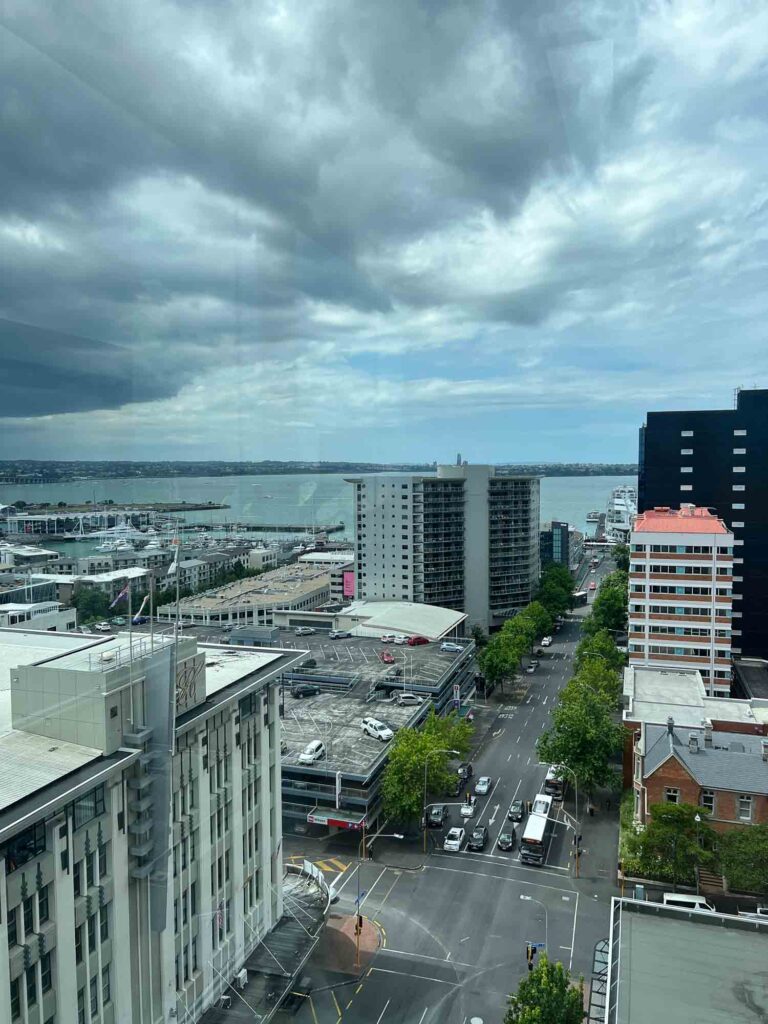
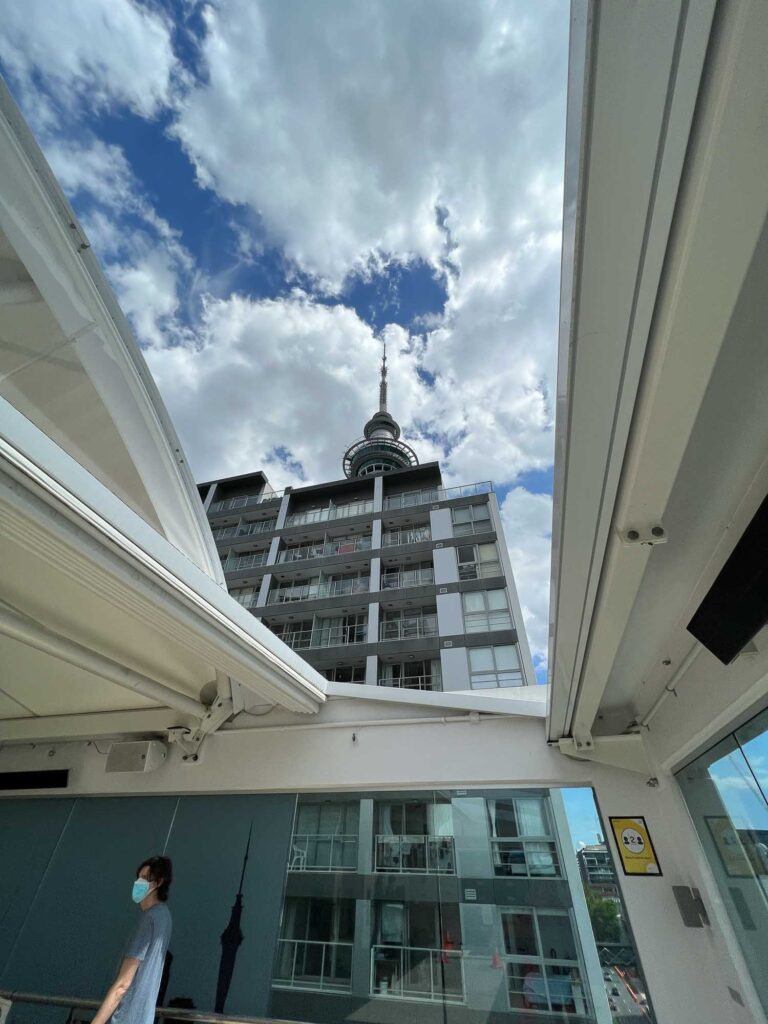
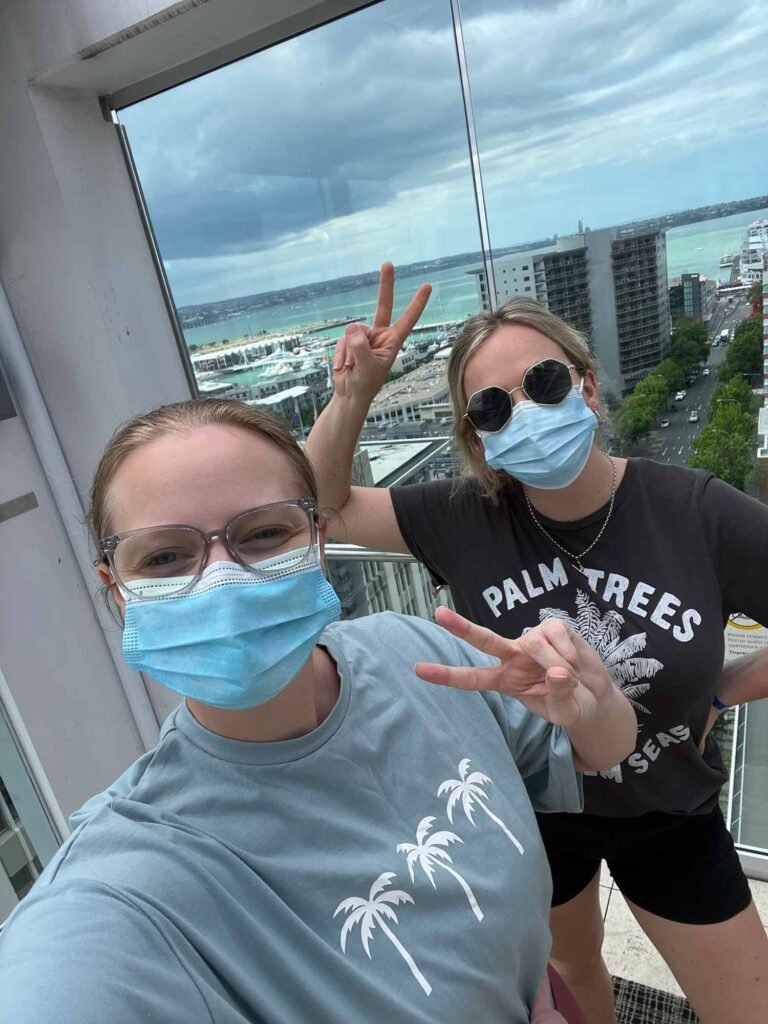
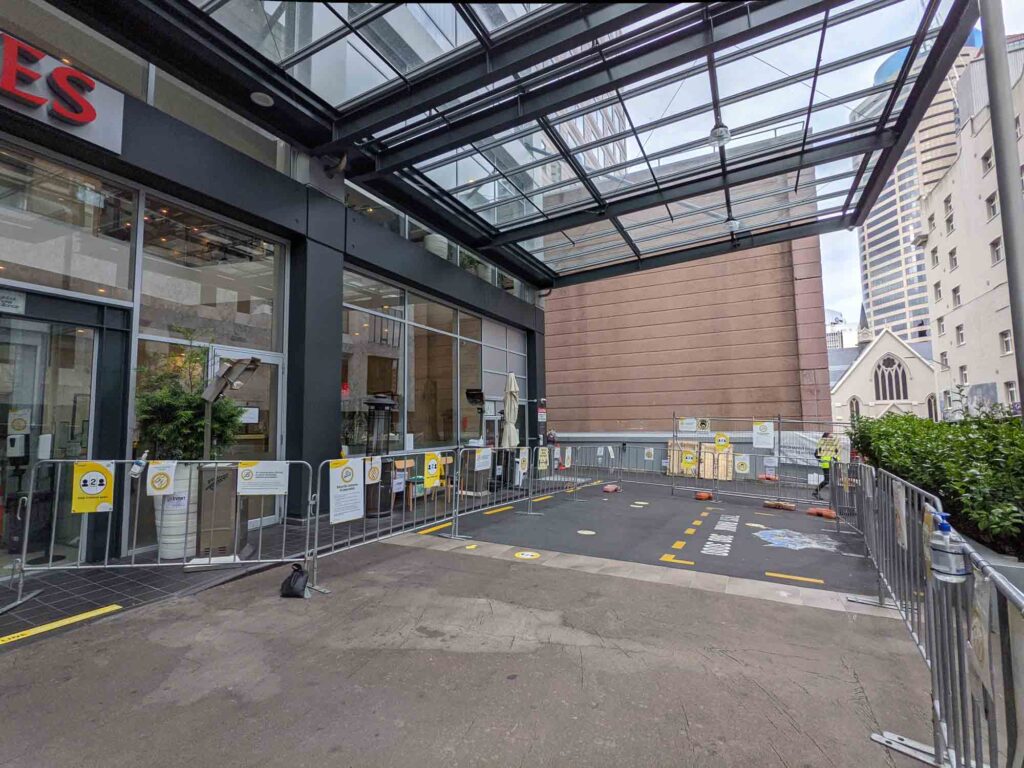
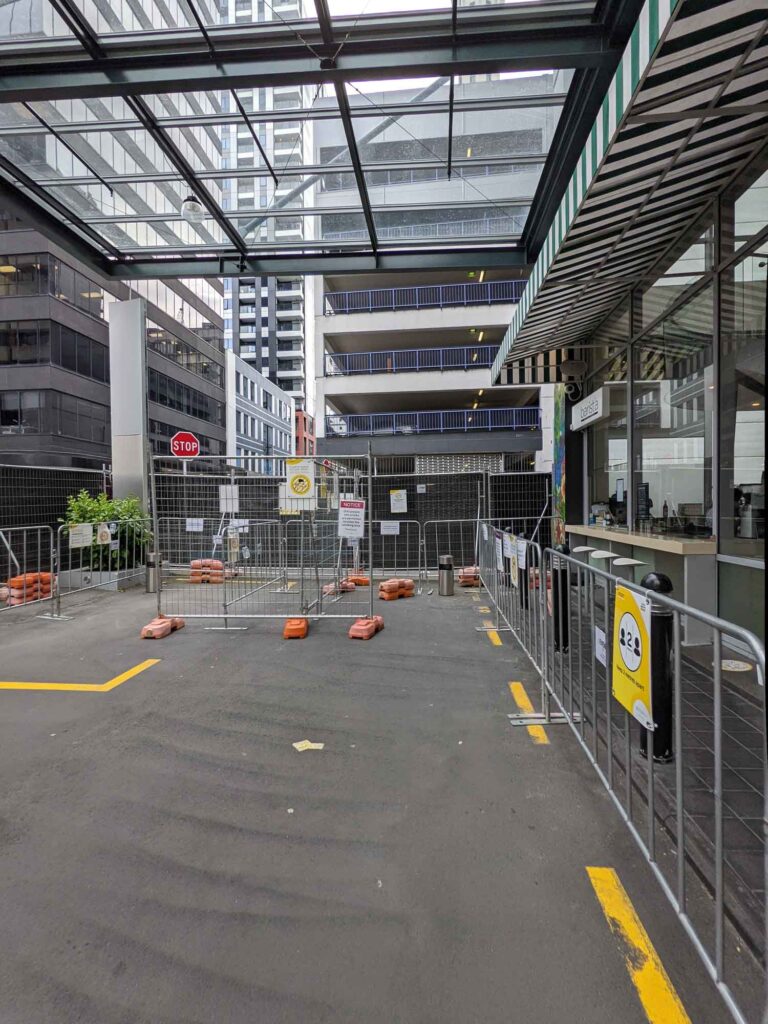
Testing in MIQ
We had three tests in MIQ and then another while self-isolating at home before our full freedom.
Our first test was on day 1 (the day we arrived counted as day 0), the second test was day 3, and then we had our final MIQ test on day 5.
We also had health checks every day through email and by phone, where they just asked about any Covid symptoms and also asked if we were doing okay in terms of food, sleep and exercise.
Covid safety in MIQ
All staff are dressed in full PPE and MIQ guests have to wear medical masks any time they’re in a common area. Guests can only leave their rooms for exercise and for testing.
When you open your door to get food that’s been dropped off you have to put on your mask, wash your hands and close the window before you open the door.
Only one bubble is allowed in the lift at any one time.
Health and support in MIQ
Bex and I were fortunate enough to need any additional support in MIQ so I can’t speak about how it would’ve been for people who had these needs.
In our daily health check they asked us if we needed any medical or mental health support but we didn’t, so I’m not sure of the process if you said yes.
MIQ essentials
If you’re coming to MIQ in the next few months, here are some important things to pack:
- Lightweight plates, bowls and cutlery
- Dish cloth, dishwashing liquid and tea towel
- Water bottle
- Chromecast, Apple TV or other streaming device
- A bluetooth speaker
- Fun stuff like a puzzle (our hotel had ones you could order!), cards, board games
- Ear plugs and an eye mask if you need them
- Fitness bands for easy in-room work outs (we had these but never used them, classic)
And that’s a detailed rundown of our time in MIQ! I’ll be adding to this post as I get more questions on Instagram or in the comments, so let me know if there’s anything else you want to hear about.
